


Accessibility tools
Service tools
Language selector
Navigation path
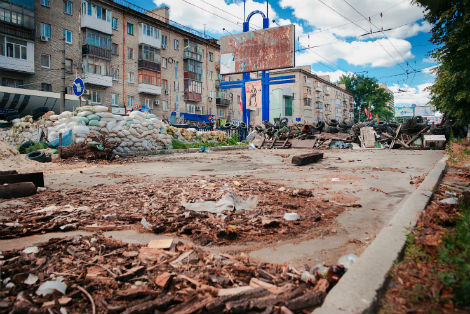
The European Union is following with great concern the ongoing conflict in Ukraine, especially its impact on the civilian population. The number of injured and displaced and those left in need of assistance has been increasing steeply in recent months. With winter on the doorstep, the situation is additionally worrying.
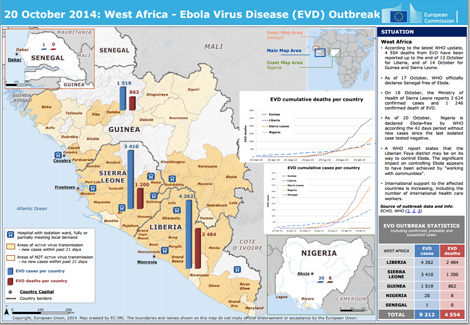
Several African countries are struggling with an outbreak of Ebola which has claimed more than 2800 lives. The European Commission is part of the international efforts to contain the spread of the deadly disease.
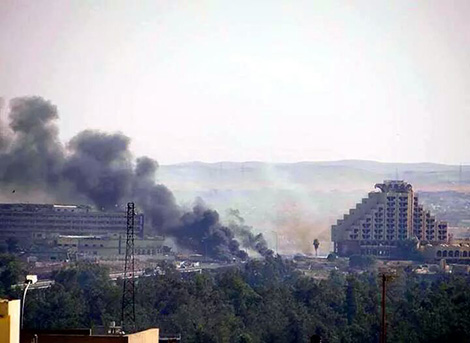
The worsening conflict in Iraq has pushed the country into a large humanitarian crisis. More than 1.2 Iraqi have been internally displaced in recent months. About 1.5 million people need humanitarian aid.
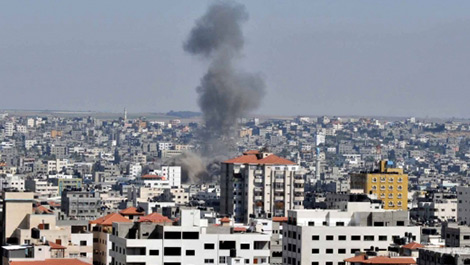
The escalation of violence in the Gaza Strip is having a dramatic humanitarian impact. The European Union calls for the protection of civilians and appeals to all parties to respect International Humanitarian Law.
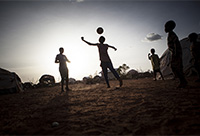
Every child, everywhere, should have the opportunity to reach their potential and grow up in peace. This is why in 2012 the leaders of the EU institutions turned the Nobel Prize for Peace, just awarded to the European Union, into a vehicle for promotion of peace and support to the most vulnerable victims of war: children. The EU Children of Peace initiative was born.
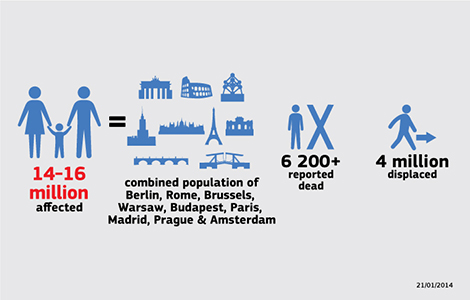
Philippines: Typhoon Haiyan recovery
Haiyan/Yolanda was the most destructive typhoon of 2013. In the Philippines, more than 6 200 people have been officially reported dead, more than a thousand are missing, four million displaced and between fourteen and sixteen million affected, out of which six million are children.
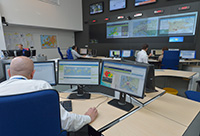
A sharper focus on risks and emergencies
Rapid, well-coordinated response is essential in emergencies. To improve Europe's capacity to react to disasters, the European Commission relies on its new, state-of-the-art Emergency Response and Coordination Centre (ERCC).
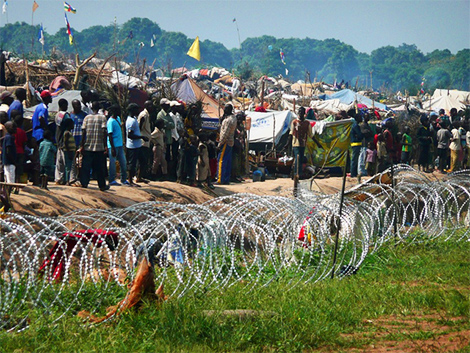
The Central African Republic (CAR) is the scene of a desperate and massive humanitarian crisis. The European Union is helping bring relief to the suffering population.
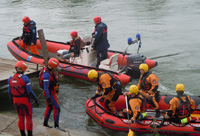
Heavy rains have led to a rising of river levels and floods in parts of the Czech Republic, Germany and Austria. There are 18 victims. The situation is still unfolding: waters are receding in some areas and continue to rise in others.
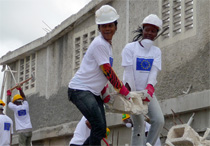
Haiti: helping keep hope alive
On 12 January 2010, Haiti was struck by a devastating earthquake that killed over 200,000 people, injured many thousands and made 1.7 million homeless. The disaster hit a nation where many were already living in great poverty and vulnerability.
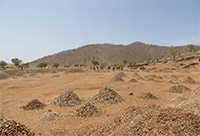
Fighting hunger and poverty through resilience
Recurrent crises have affected 31 million people in the Horn of Africa and the Sahel region of Africa, while natural disasters have hit populations hard from Haiti to Japan. These are only the latest arguments for a sustained effort to increase the resilience of vulnerable people. Resilience saves more lives and contributes to poverty reduction. It is also cost-effective, boosts the impact of aid and contributes to sustainable development.
One of the Lisbon Treaty's most exciting innovations is set to launch in 2014 – EU Aid Volunteers, a programme to train and deploy volunteers in humanitarian projects. It will offer close to 20 000 opportunities for volunteering worldwide during the next seven years.

Syria is now the biggest humanitarian crisis facing the world, causing deprivation and suffering inside the country and a heavy spill-over effect in the neighbourhood.
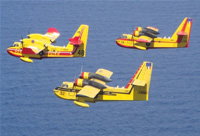
Every summer brings high risks of forest fires in Europe and no country is immune. Greece, Spain, Bulgaria and Bosnia and Herzegovina have been seriously affected in 2013. When the fire gets too big for a country to extinguish on its own, the European Union's Civil Protection Mechanism can be activated to coordinate help from participating states (water bombing aircraft, fire-fighting equipment and personnel).
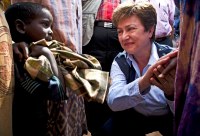
Horn of Africa crisis: one year on
The drought, war, and hunger in the Horn of Africa caused, in terms of scale and severity, the worst humanitarian crisis of 2011. Close to 13 million people were in need of emergency aid in the East African region.

Sahel: fighting hunger and vulnerability
The Sahel region in Africa (Senegal, Mauritania, Mali, Burkina Faso, Niger, and Chad) is highly exposed to food insecurity and is going through a prolonged hunger crisis. Currently, more than 10 million people are affected. The annual lean season of scarce resources and high food prices, has already started and is hitting the poorest and most vulnerable hard. Over one million children remain severely malnourished, another 4.5 million are at risk. The hunger is compounded by the Mali conflict (which has displaced nearly half a million people) and instability in northern Nigeria.
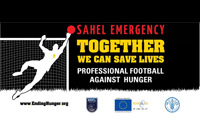
How to win the match against hunger
By Kristalina Georgieva and Raúl González Blanco. How do you feel when you are hungry? Weak. Tired. Unable to concentrate, study or work. What do you do? You grab something to eat. However, one in seven people on this planet cannot. They cannot afford to buy food and their fields are dry. They suffer from chronic hunger. Hunger leads to illness. The body starts to feed on itself, eventually leading to starvation and death.
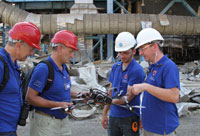
New legislation on Disaster Response Capacity
Natural and man-made disasters are growing in frequency and intensity. In December 2011 the Commission adopted a new legislative proposal which aims to reinforce the EU's disaster management. The revised legislative proposal suggests creating a European Emergency Response Capacity, moving from the current ad hoc arrangement to a predictable and reliable system that allows for good planning. Prevention and preparedness actions will be equally integrated in the EU Civil Protection Mechanism. Another key proposal is the setting up of a European Emergency Response Centre (ERC) which will be responsible for the coordination of the EU's civilian disaster response. The ERC will ensure that Member States are fully informed and able to decide about the provision of the most needed assistance.
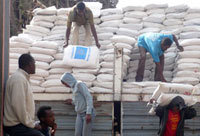
The European Commission envisages funding humanitarian interventions in 36 countries or regions in 2012. It is allocating a budget of €640 million in humanitarian aid funding next year. The projects will be implemented through the Commission's Directorate General for Humanitarian Aid and Civil Protection (ECHO).
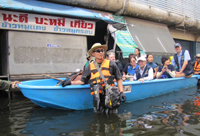
Southeast Asia hit by floods of the century
More than 11 million people are affected by the worst flooding to hit Southeast Asia in the last 60 years. The disaster has claimed close to a thousand lives and displaced half a million people.
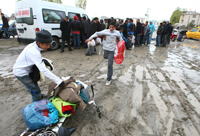
A powerful earthquake rattled eastern Turkey on 23 October. More than 600 people died and 4 152 were injured. The authorities, Red Crescent and Turkish volunteers have worked tirelessly to save hundreds trapped by the debris, but with thousands left homeless by the destruction, Turkey asked Europe to join the relief operation and help shelter the survivors.

From the start of the Libyan crisis, the European Union has stood by the people of Libya and by the foreigners who were trapped in the country due to the rise of hostilities. The European Commission continues to help meet the most pressing humanitarian needs inside the country with the presence of experts and the allocation of funds.
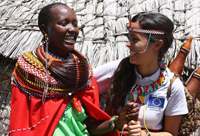
World Humanitarian Day 2011 : People helping people
August 19 is World Humanitarian Day. The day is dedicated to humanitarian workers, men and women who provide relief, assistance and hope for millions of crisis victims in the most hazardous regions of the world. The World Humanitarian Day was established in 2008 by the UN General Assembly, which picked 19 August in memory of the 22 UN humanitarian workers who were killed by the bomb explosion in the UN office in Baghdad, Iraq, on 19 August 2003. One of them was the UN Secretary General's Special Representative Sergio Vieira de Mello.

Japan was hit by one of its worst disasters in history on March 11 2011. The European Union responded with an outpouring of compassion and solidarity towards the Japanese people. Aid was also quick to come – the EU provided €17 million in financial and in-kind assistance.
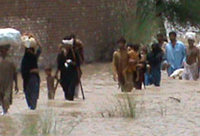
One year after the worst monsoon floods in 80 years, vulnerable populations in Pakistan are still struggling to rebuild their lives and recover from the effects of the disaster. The European Union continues to support the worst-affected populations with generous humanitarian aid. More than 20 million people were affected by the floods, over 1 900 people died and an estimated 12.5 million required urgent humanitarian assistance. In 2010, the European Commission helped those in the direst need with €150 million in humanitarian assistance. A further €76 million has been committed to cover continuing acute needs in the affected areas such as shelter, water and sanitation, food, livelihood recovery and healthcare. Floods in Pakistan : one year later